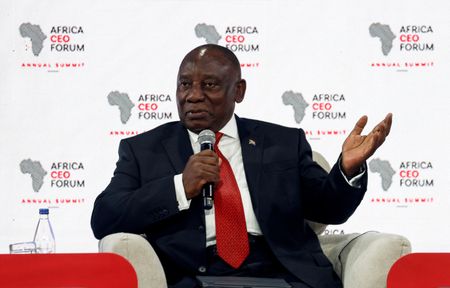By Shariq Khan
NEW YORK (Reuters) -Oil prices traded steady on Monday as signs of a breakdown in U.S. talks with Iran over its nuclear program offset pressure from a Moody’s downgrade of the U.S. sovereign credit rating.
Brent crude futures were down 20 cents to $65.21 a barrel by 1:36 p.m. ET (1736 GMT), while U.S. West Texas Intermediate crude was up 3 cents, or 0.1%, at $62.52 a barrel.
Both contracts rose more than 1% last week.
Nuclear talks between Iran and the U.S. will lead nowhere if Washington insists that Tehran stop its uranium enrichment activity, Iranian state media quoted Deputy Foreign Minister Majid Takht-Ravanchi as saying on Monday.
That remark dented hopes for an agreement between the two sides, which would have paved the way for the easing of U.S. sanctions and allowed Iran to raise its oil exports by 300,000 to 400,000 barrels per day, StoneX analyst Alex Hodes said.
“That potential increase looks very unlikely now,” he said.
Oil prices, however, were under pressure from Moody’s downgrade of the U.S. sovereign credit rating, which raised questions about the economic health of the world’s largest oil consuming nation, as well as data that showed slowing industrial output growth and retail sales in China, the top oil importer.
“The weaker-than-expected Chinese data is not helping crude oil, although I would describe the setback as modest,” said UBS analyst Giovanni Staunovo.
Adding to the pressure on the oil market were comments from U.S. Treasury Secretary Scott Bessent, who said that President Donald Trump will impose tariffs at the rate he threatened last month on trading partners that do not negotiate in “good faith.”
Oil prices are likely to remain volatile for the foreseeable future as investors look for updates on the tariffs, the U.S.-Iran negotiations, and the talks to end the war in Ukraine, said John Kilduff, partner at Again Capital in New York.
Russian President Vladimir Putin, after a call with Trump on Monday, said that Moscow was ready to work with Ukraine on a memorandum about a future peace accord and that efforts to end the war were on the right track.
An end to that war would allow higher Russian oil exports and would likely push crude prices sharply lower, Kilduff said.
(Reporting by Shariq Khan and Alex Lawler; Addiitional reporting by Seher Dareen, Florence Tan, and Emily Chow; Editing by Paul SimaoEditing by David Goodman, David Evans, Barbara Lewis and Paul Simao)






